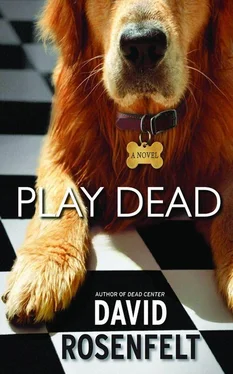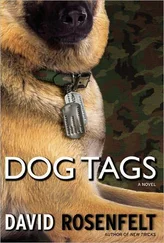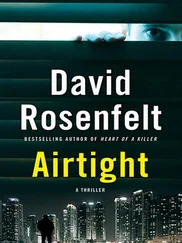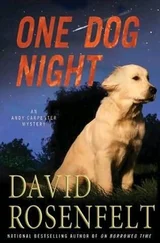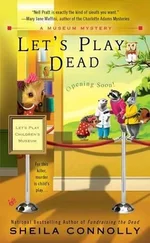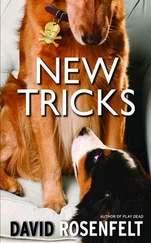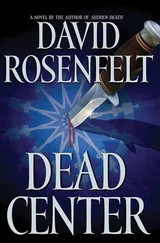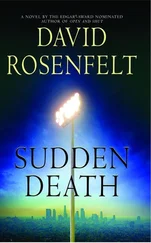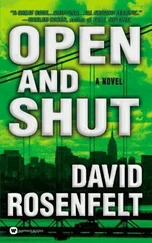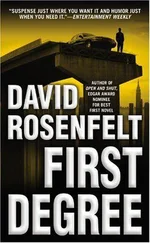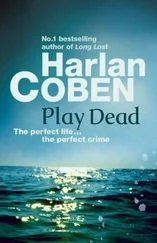David Rosenfelt - Play Dead
Здесь есть возможность читать онлайн «David Rosenfelt - Play Dead» весь текст электронной книги совершенно бесплатно (целиком полную версию без сокращений). В некоторых случаях можно слушать аудио, скачать через торрент в формате fb2 и присутствует краткое содержание. Год выпуска: 2009, Жанр: Детективная фантастика, на английском языке. Описание произведения, (предисловие) а так же отзывы посетителей доступны на портале библиотеки ЛибКат.
- Название:Play Dead
- Автор:
- Жанр:
- Год:2009
- ISBN:нет данных
- Рейтинг книги:3 / 5. Голосов: 1
-
Избранное:Добавить в избранное
- Отзывы:
-
Ваша оценка:
- 60
- 1
- 2
- 3
- 4
- 5
Play Dead: краткое содержание, описание и аннотация
Предлагаем к чтению аннотацию, описание, краткое содержание или предисловие (зависит от того, что написал сам автор книги «Play Dead»). Если вы не нашли необходимую информацию о книге — напишите в комментариях, мы постараемся отыскать её.
Play Dead — читать онлайн бесплатно полную книгу (весь текст) целиком
Ниже представлен текст книги, разбитый по страницам. Система сохранения места последней прочитанной страницы, позволяет с удобством читать онлайн бесплатно книгу «Play Dead», без необходимости каждый раз заново искать на чём Вы остановились. Поставьте закладку, и сможете в любой момент перейти на страницу, на которой закончили чтение.
Интервал:
Закладка:
It bothers me to come here, and I rarely do. I leave this job to my former legal client, Willie Miller, who is my partner in the Tara Foundation, a dog rescue operation. We rescue a lot of dogs, over a thousand a year, but there are many more worthy ones that we simply do not have room for. I hate making the life-or-death decisions on which ones we will take, and Willie has been shouldering that responsibility.
Unfortunately, Willie and his wife, Sondra, are in Atlantic City for a few days, and we’ve got some openings for new dogs, so here I am. I’ve been dreading it, and based on what Fred has just said to me, I fear that dread has been warranted.
Fred leads me back to the quarantine room, which houses dogs who are sick or are unavailable to be adopted for other reasons. The other reason is usually that the dog has bitten someone; in that case they are held for ten days to make sure they don’t have rabies, and then put down. “Put down” is shelter talk for “killed.”
Fred points to a cage in the back of the quarantine room, and I walk toward it, cringing as I do. What is there turns out to be far worse than expected; it’s one of the most beautiful golden retrievers I’ve ever seen.
Golden retrievers do not belong in cages. Ever. No exceptions. The dog I’m looking at is maybe seven years old, with more dignity in his eyes than I could accumulate in seven hundred years. Those eyes are saying, “I don’t belong in here,” and truer eye words were never spoken.
I can feel myself getting angry at this obvious injustice. “What the hell is this about?” I ask as Fred walks over.
“He bit his owner. Eleven stitches,” Fred says. “Not that I blame him.”
“What do you mean?”
“Well, for one thing, the owner is an asshole. And for another, he might not even be the owner.”
“Tell me everything you know,” I say.
It turns out that Fred doesn’t know that much. A man named Warren Shaheen, who had just come home from the hospital, called him to a house in Hawthorne. He said he had been bitten by his dog, Yogi, for no reason whatsoever. He wanted the dog taken to the shelter and put down.
As Fred and Yogi were leaving the house, a young boy who claimed to live next door approached. He said that Warren was always kicking the dog, and he was sure that the dog bit him in retaliation. Further, he claimed that Warren had found the dog wandering on the street less than three weeks ago and apparently made no effort to find the real owner.
“What are you going to do?” I asked.
Fred shrugged. “You know the drill. After ten days, we put him down. We’re not allowed to adopt him out.”
I ask Fred if he’ll open the cage and let me take the dog out. He knows he shouldn’t, but does so anyway.
I take Yogi into a small room where potential adopters go to get to know the dogs they might take. I sit in the chair, and Yogi comes over to me. He has cut marks on his face, clearly visible in this light. They look old, perhaps remnants from some long-ago abuse. It’s likely that Yogi has not had the best life.
He puts his paw up on my knee, a signal from goldens that they want their chest scratched. I do so, and then he rests his head on my thigh as I pet it.
Fred comes over to the room, looks in and sees me petting Yogi in this position. “Pretty amazing, huh?”
“Fred, I’m aware of the regulations, but there’s something you should know.”
“What’s that?”
“Nothing bad is going to happen to this dog.”
* * * * *
I HAVE COME to the conclusion that the entire “work ethic” concept is a scam.
Hardworking people are to be admired, we’re told, though no one mentions that the very act of working is contrary to the natural order of things. It falls to me, Andy Carpenter, philosopher extraordinaire, to set the record straight.
I believe that humans have an “enjoyment drive,” which supersedes all others. Everything we do is in the pursuit of that enjoyment. We eat because it’s more enjoyable to be full than hungry; we sleep because it’s more enjoyable to be rested than tired; we have sex because… I assume you get the picture.
We work simply to make money, because money makes our lives more enjoyable in many ways. If you take money out of the equation, the work system falls apart. Without the desire for cash, who is going to say, “I think I’ll spend ten hours a day for my entire life selling plumbing supplies”? Or waiting tables? Or repairing vacuum cleaners?
There are people, I will concede, who would pursue certain occupations independent of money. For example, artists, politicians, or perhaps entertainers might do what they do for the creative satisfaction or the power or the acclaim. But that’s only because they enjoy creative satisfaction, power, and acclaim.
Which brings me to me. I am work-ethically challenged. Simply put, I’m a lawyer who has never been terribly fond of lawyering. Since I inherited twenty-two million dollars a few years ago, money has ceased to be a driving force, which means I don’t exactly have a busy work life.
There are exceptions to my aversion to plying my craft, which fit neatly under my drive for enjoyment. I’ve handled a number of major, challenging cases in the past few years, most of which became big media events. The key for me is to treat them as sport, as a challenge to be relished, and that’s what I did.
But those cases were as important to me personally as they were professionally, which elevated the stakes and made them that much more enjoyable and exciting. They ignited my competitive fire. If I were representing some stranger in a divorce or suing an insurance company over an auto accident, I’d rather stay home.
Right now I can feel my juices starting to flow as I head for the office. On the way there I call my associate, Kevin Randall, on his cell phone.
His “Hello” is spoken in a hushed whisper.
“What’s the matter?” I ask.
“I’m at my urologist,” he says.
Kevin is the biggest hypochondriac in the Western Hemisphere, and five out of every ten times I might call him he’s at the doctor. “You have your own urologist?” I ask. “That’s pretty impressive.”
Kevin knows I am unable to resist making fun of his devotion to his perceived illnesses, but he is equally unable to resist talking about them. “You don’t? Who do you see for urology issues?”
“I have no tolerance for urology issues,” I say. “I piss on urology issues.”
He doesn’t like the way this conversation is going, which makes him sane. “Why are you calling me, Andy?”
“To ask if you could meet me in the office. When you’re finished at the urologist.”
“Why?” he asks. Since we haven’t taken on a case in a few months, it’s a reasonable question to pose.
“We’ve got client issues,” I say.
“We have a client?” He’s not successfully masking his incredulity.
“Yes.”
“Who is it?”
“His name is Yogi,” I say.
“Yogi? Is that a first name or a last name?” Kevin knows nothing about sports, so he is apparently not familiar with Yogi Berra. However, I would have thought he’d know Yogi Bear.
“Actually, it’s his only name, and probably not his real one at that. Listen, Kevin, I’m pretty sure he can’t pay our fee. Are you okay with that?”
“Of course.” I gave Kevin half of a huge commission we made on a case a while back, so money is not a major issue for him, either. Additionally, he owns the Law-dromat, a thriving establishment at which he dispenses free legal advice to customers who bring in their clothes to be washed and dried. “What is he accused of?”
“Assault,” I say.
“Where is he now?”
“On death row.”
Читать дальшеИнтервал:
Закладка:
Похожие книги на «Play Dead»
Представляем Вашему вниманию похожие книги на «Play Dead» списком для выбора. Мы отобрали схожую по названию и смыслу литературу в надежде предоставить читателям больше вариантов отыскать новые, интересные, ещё непрочитанные произведения.
Обсуждение, отзывы о книге «Play Dead» и просто собственные мнения читателей. Оставьте ваши комментарии, напишите, что Вы думаете о произведении, его смысле или главных героях. Укажите что конкретно понравилось, а что нет, и почему Вы так считаете.
